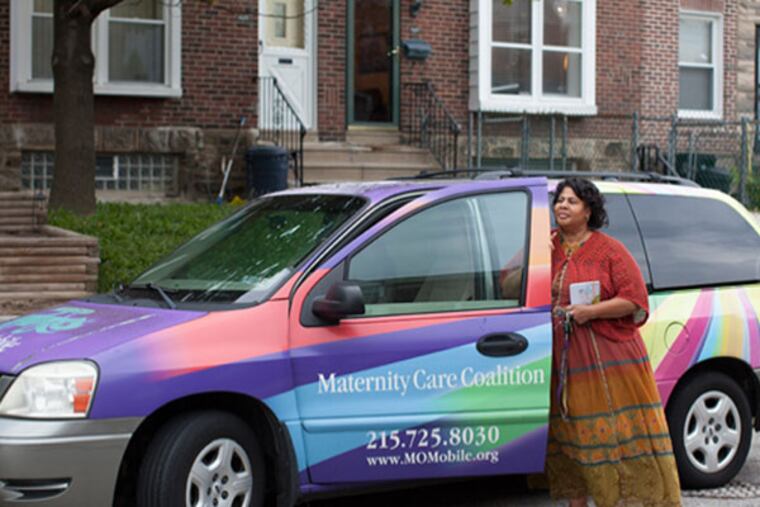Merck to expand maternal health-care effort
For women with limited resources and chronic illnesses such as diabetes, having a baby can be both joyous and perilous.

For women with limited resources and chronic illnesses such as diabetes, having a baby can be both joyous and perilous.
Merck & Co., the pharmaceutical giant with facilities in Pennsylvania and New Jersey, is joining with nonprofit organizations in Philadelphia and Camden to reduce that peril by working to improving maternal health care.
Merck said Tuesday that it was underwriting new outreach efforts by the Maternity Care Coalition, long known for its MOMobile home-visiting services, and the Camden Coalition of Healthcare Providers, nationally recognized for improving access to and coordination of care in New Jersey's poorest city.
Each has received $150,000 for planning, with funding for implementation yet to be set. The drugmaker has committed $6 million to the local programs and others across the nation, including in Baltimore and New York City.
It's all part of Merck for Mothers, a 10-year, $500 million effort launched in 2011 to reduce deaths related to pregnancy and childbirth worldwide.
"Our reason for being has always been to save and improve lives," said Kenneth C. Frazier, the company's chairman and chief executive officer. "This initiative is fully compatible with that mission."
Starting in developing countries, Merck for Mothers has worked with partner organizations to improve diagnosis, prevention, and treatment of the two leading causes of maternal mortality: postpartum hemorrhage and the high-blood-pressure disease preeclampsia.
Frazier said Merck decided to broaden the initiative to the United States last year because this country ranks a dismal 47th in maternal death rates. The United States is "dead last in the developed world and behind numerous" less-developed countries, including Turkey and Saudi Arabia, Maternity Care Coalition executive director JoAnne Fischer wrote recently.
In Pennsylvania, she said, the maternal death rate per 100,000 births rose from 9.7 in 2005 to 14.5 in 2010. The rates are even worse in cities. For every 100,000 births, 18 women die in Philadelphia and 30 in Camden.
The problem in the United States is not a lack of technology, expertise, or wealth. Rather, too many women, especially poor ones, come into pregnancy with chronic and poorly controlled health problems, including obesity, hypertension, diabetes, substance abuse, and mental illness.
"Helping those women is particularly important," Frazier said.
Len Terranova, director of planning and performance improvement for the Camden Coalition, cited statistics illustrating the need in that city: Of the 2,000 women a year who give birth, only half get prenatal care in the first three months of pregnancy - yet half visit a hospital emergency room around the time of birth because of a chronic illness.
Many health-improvement programs in South Jersey "exclude moms with complex medical conditions," Terranova said.
With Merck's backing, the coalition plans to identify such women, coordinate multidisciplinary care during pregnancy, and then connect them to postnatal health care.
"We're pretty confident that we could change the system for every pregnant mom in Camden," he said. "Merck for Mothers is a unique effort in that there is not talk about products or marketing a product for them. Maternal health is something they believe in deeply here and in the developing world."
The Maternity Care Coalition's program will focus on pregnant women with chronic illnesses in North Philadelphia - which happens to be where Merck's Frazier grew up.
"A lot of the women we work with can be seeing four or five health-care providers" because they have so many problems, said Bette Begleiter, deputy director of the maternity coalition. "For the first time, we will be able to go with the woman into the doctors' offices" to coordinate care, explain and educate, and make sure they follow instructions. Text messaging between visits will provide reminders and encouragement.
The Merck funding also will enable women to have a doula, or childbirth coach. "That really helps to reduce cesarean sections, increase breast feeding, and reduce postnatal depression," Begleiter said.
"We are very grateful" to Merck, she added. "This is groundbreaking for us."
By the Numbers
14.5: Maternal death rate, in Pennsylvania, per 100,000 births in 2010; rose from 9.7 in 2005
18: For every 100,000 births, number of women who die in Philadelphia
30: For every 100,000 births, number of women who die in Camden
215-854-2720 @repopter